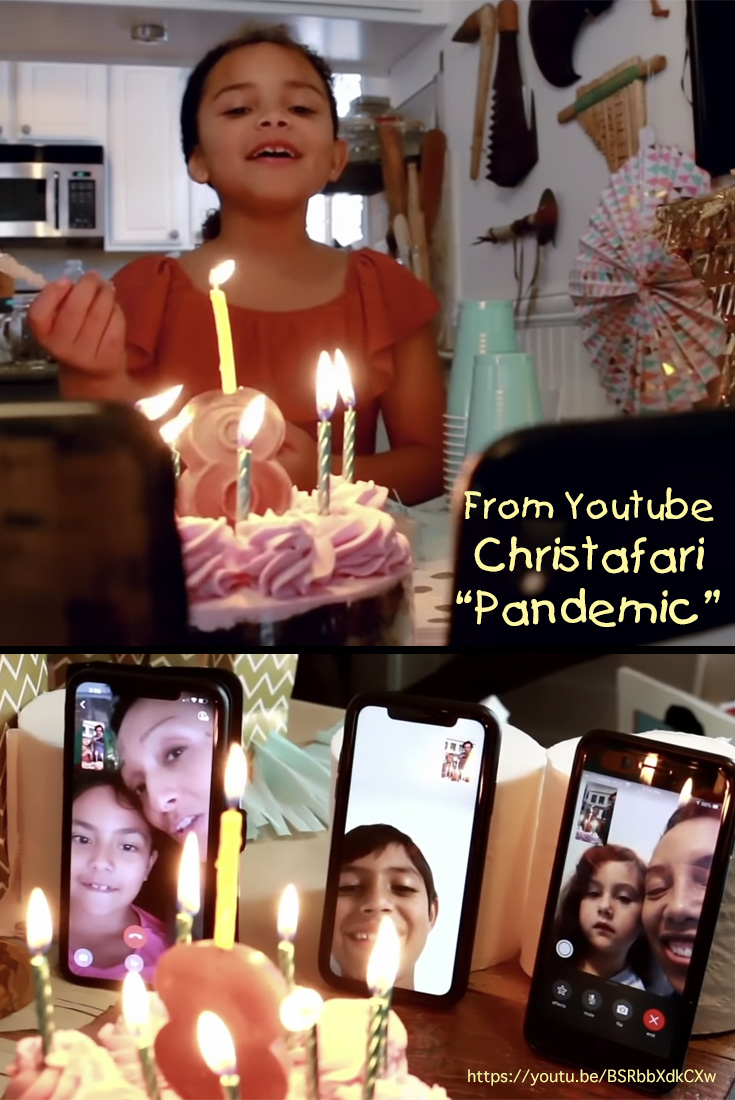↑Birthday Celebrations ~ then and now
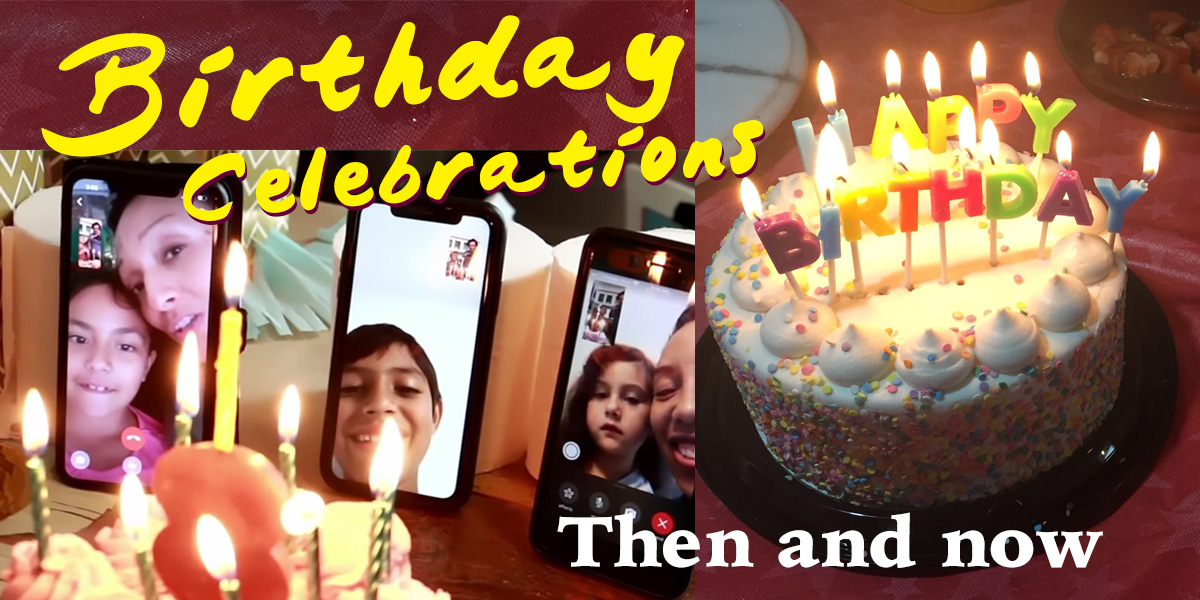 Birthday cakes, virtual parties, and second birthdays ⇔
Birthday cakes, virtual parties, and second birthdays ⇔
Aug 2020. wp.krigline.com ⇔
Underlined terms are defined below. (Shorter versions of this post, for the EFL classroom, can be found on my other website— EFLsuccess.com—which is full of resources for English teachers and learners.)
Today we’ll talk about birthday traditions, and the Christian idea of a “second birthday.”
Warm up: What are your favorite birthday traditions? What is your favorite thing to do on a birthday?
When I was teaching in Beijing, I wanted to make a new friend and practice speaking Chinese. So, I walked into a “jiaozi” fast-food eatery near the train station, and sat next to a friendly stranger my own age whom I’ll call “Dan.” As we got to know each other, I said my birthday was coming up and asked when his birthday was. “Which one?” Dan asked. At first I thought I misunderstood, but he was serious! “I have two birthdays,” Dan said. “While I was born on Feb 15, I almost drowned on Sept 2 but someone saved my life, so I celebrate that as my Second Birthday.” To Dan’s surprise, I said I have two birthdays too! (I’ll explain in a moment.)
Food, gifts, songs, flowers and piñatas are among the many traditions that make birthday celebrations popular. Whether you are turning One, 100, or anything in between, your birthday party will likely have a beautiful cake, and often also features your favorite food and/or ice cream flavor. Many people take photos of a baby’s messy first birthday cake experience. My parents have a video of my brother’s first party—including the painful moment he grabbed the lighted candle! Both the young and the young-at-heart like to remember birthdays with a party for friends, which often includes music and/or dancing. In America, guests (and relatives) often present a colorfully-wrapped gift to the “birthday boy or girl,” and even those far away may send a decorative Birthday Card or flower arrangement.
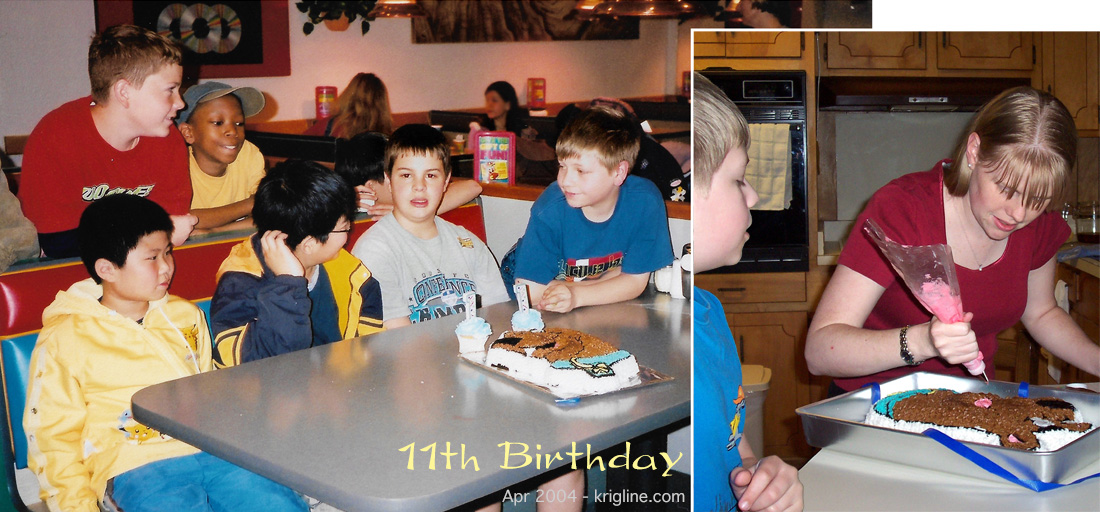
Our son’s 11th birthday with friends and a Scooby-Doo cake lovingly made by his big sister. I couldn’t find any photos of the obstinate piñata at his party a few years earlier (the kids found it almost impossible to break open!).
Discussion 2: Tell us about the best birthday party (or birthday gift) you can remember.
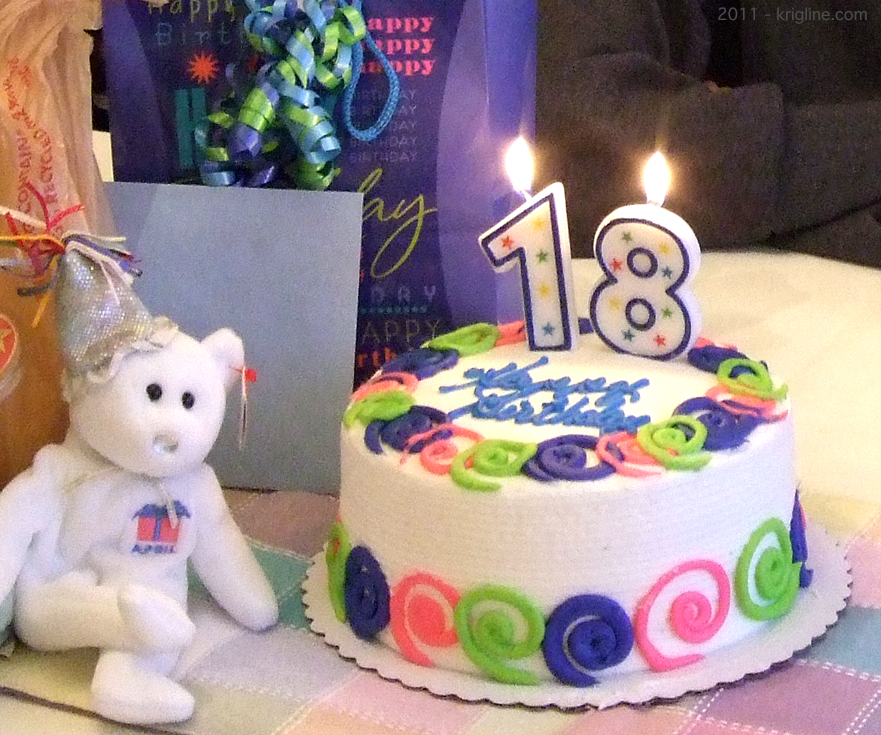 The tradition of a birthday cake with candles dates back to at least 18th-century Germany. According to Readers Digest, “On the morning of a child’s birthday, he or she would receive a cake with lighted candles that added up to the kid’s age, plus one. This extra candle was called the ‘light of life,’ representing the hope of another full year lived.” The article said that the child made a secret wish and tried to blow out all the candles with one breath—a tradition that is still common today. As people became more wealthy, the cakes became more elaborate, with sweet icing, special decorations, and multiple layers.
The tradition of a birthday cake with candles dates back to at least 18th-century Germany. According to Readers Digest, “On the morning of a child’s birthday, he or she would receive a cake with lighted candles that added up to the kid’s age, plus one. This extra candle was called the ‘light of life,’ representing the hope of another full year lived.” The article said that the child made a secret wish and tried to blow out all the candles with one breath—a tradition that is still common today. As people became more wealthy, the cakes became more elaborate, with sweet icing, special decorations, and multiple layers.
The “Happy Birthday to You” song is the most frequently sung English song in the world. If your party is in a restaurant, the staff may gather around your table to sing it together. The tune dates back to 1893, credited to a Kentucky kindergarten teacher and her older sister (Patty and Mildred Hill). We don’t know who wrote the lyrics, first published in 1912, and made famous in Broadway musicals in the 1930s. For years, legal battles raged over who owned the song. To make a long story short, a 2013 lawsuit had a happy ending for us all, when Warner Music paid $14 million to put “Happy Birthday” into the public domain. Now, everyone is legally allowed to sing it!
Today, many American birthday parties feature a piñata–a colorful paper-covered shape (animal, star, etc) that is suspended above party guests. Blindfolded guests try to hit it with a stick; when finally broken open, candy spills out. According to Mexconnect.com, Marco Polo introduced piñatas to Europe in the late 1200s, based on Chinese clay figures adorned with colored paper; they spilled seeds when struck. By the 14th century, the European custom adapted to the 40-day pre-Easter celebration known as Lent; the first Sunday in Lent became “Piñata Sunday.” Spanish missionaries introduced this to central America and added Christian symbolism. 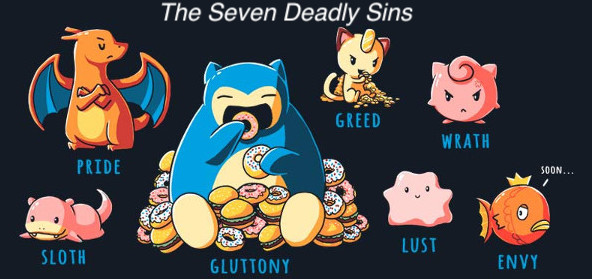 The most traditional style piñata had seven points, representing the “seven deadly sins,” pecados – greed, gluttony, sloth, pride, envy, wrath and lust. The blindfolded participant represents “faith,” trusting what we can’t see clearly. The candy and fruit trapped inside represented “hope,” and when spilled out for all it represented “love.” Why not make (and break open) a piñata during your own next birthday party?
The most traditional style piñata had seven points, representing the “seven deadly sins,” pecados – greed, gluttony, sloth, pride, envy, wrath and lust. The blindfolded participant represents “faith,” trusting what we can’t see clearly. The candy and fruit trapped inside represented “hope,” and when spilled out for all it represented “love.” Why not make (and break open) a piñata during your own next birthday party?
Discussion 3: It is said that we all struggle with the “seven deadly sins.” Do you understand all of these terms? (greed, gluttony, sloth, pride, envy, wrath and lust) Which do you struggle with the most, or how have you overcome this problem?
During COVID-19, many traditions have had to change. Unable to be with friends in person, some people have a virtual birthday party. Each participant plans ahead, sending a gift by mail to the “birthday boy/girl,” and preparing a cake or treat to enjoy during the party. Then, connected by smartphones, guests can share stories, sing, and laugh as their friend opens their gifts. One advantage of a Pandemic Birthday Party is that you can even celebrate with friends on the other side of the globe!
Why do I have two birthdays? As I explained to Dan, during my first year in college, someone also saved my life. That year, I embraced “the light of life” and was baptized as a Christian on Dec 24 (Christmas Eve). Jesus said that whoever comes to him in faith is “born again” and “adopted” into his family, so I celebrate that date as my Second Birthday. “I am the light of the world,” Jesus said; “Whoever follows me will not walk in darkness, but will have the light of life.” (John 8:12 ESV) I was “drowning” in a self-centered life with no real meaning; Jesus’ “light of life” gave me love, forgiveness, lasting friendships, and a new purpose: to serve Him in love, and to invite others to know Him so they can have a “Second Birthday” too!
~Michael Krigline; wp.krigline.com; EFLsuccess.com
Discussion
- What are your favorite birthday traditions?
- Tell us about the best birthday party (or birthday gift) you can remember.
- It is said that we all struggle with the “seven deadly sins.” Do you understand all of these terms? (greed, gluttony, sloth, pride, envy, wrath and lust) Which do you struggle with the most, or how have you overcome this problem?
- Do you have one birthday or two? If “two,” please explain.
- Christians say that they are “born again” or “born from above” (John 3:3). What do you think they mean by this? (After talking about it, you can look at my partial answer.)
- What are the advantages and disadvantages of having a Pandemic Birthday Party as described?
- Read John 8:12 again. What do you think he means by “darkness” and “light”? What are some examples of “walking in darkness”?
- If you have time, watch the “Pandemic anthem” on YouTube (https://youtu.be/BSRbbXdkCXw), which includes pictures of a virtual birthday party. What is your favorite part of the music video?*
Vocabulary:
- drown: to die by being under water too long
- fast food: the kinds of food (e.g., hamburgers, instant noodles) that can be given to customers quickly, so they can eat in a short time or take them away
- hope: a confident, positive expectation (not just wishful thinking)

- in person: face-to-face, not virtually, in a photo, by letter, etc. A few years ago, I saw the Olympic Games in person.
- jiaozi: Chinese dumplings; a boiled pastry shell with meat inside, and sometimes leftovers are fried.
- lyrics: the words of a poem or song That song’s music and lyrics were written by Dolly Parton.
- pandemic: (technical) a disease that affects people over a very large area country or even the whole world.
- piñata: [from Spanish] a decorated paper container filled with candy, small toys, etc; it is hung overhead and children try to break it open with a stick
- (in the) public domain: [legal] something creative (art, song, photo…) that is available for anyone to have or use, usually because of its age Mark Twain’s remarkable books are in the public domain, so you can find free PDF files online.
- smartphone: a mobile phone that is also a small computer, that can connect to the internet, take photos, run apps, etc.
- tradition: [countable] a belief, custom, or way of doing something that has existed for a long time; [uncountable] all of these beliefs, customs, etc., in general. (传统)
- virtual: (adj) seen or created on a computer or online instead of in the real world
Sources and resources:
- https://www.rd.com/article/origin-of-birthday-cake/
- https://www.rd.com/article/happy-birthday-song-facts/
- https://youtu.be/BSRbbXdkCXw
- https://www.elcivics.com/esl/birthday-party/lesson-3.html
- https://www.mexconnect.com/articles/459-history-of-the-pinata/
*Footnote: You can find the words to Christafari’s “Pandemic” at musixmatch.com/lyrics/Christafari/Pandemic-Covid-19-Quarantine-Anthem
Original content ©Michael Krigline, including photos if noted. For contact info, visit About Us. To make a contribution, see our Website Standards and Use Policy page (under “About Us”). [My titles that start with ↑ point to devotional articles that help us “look up”.]


